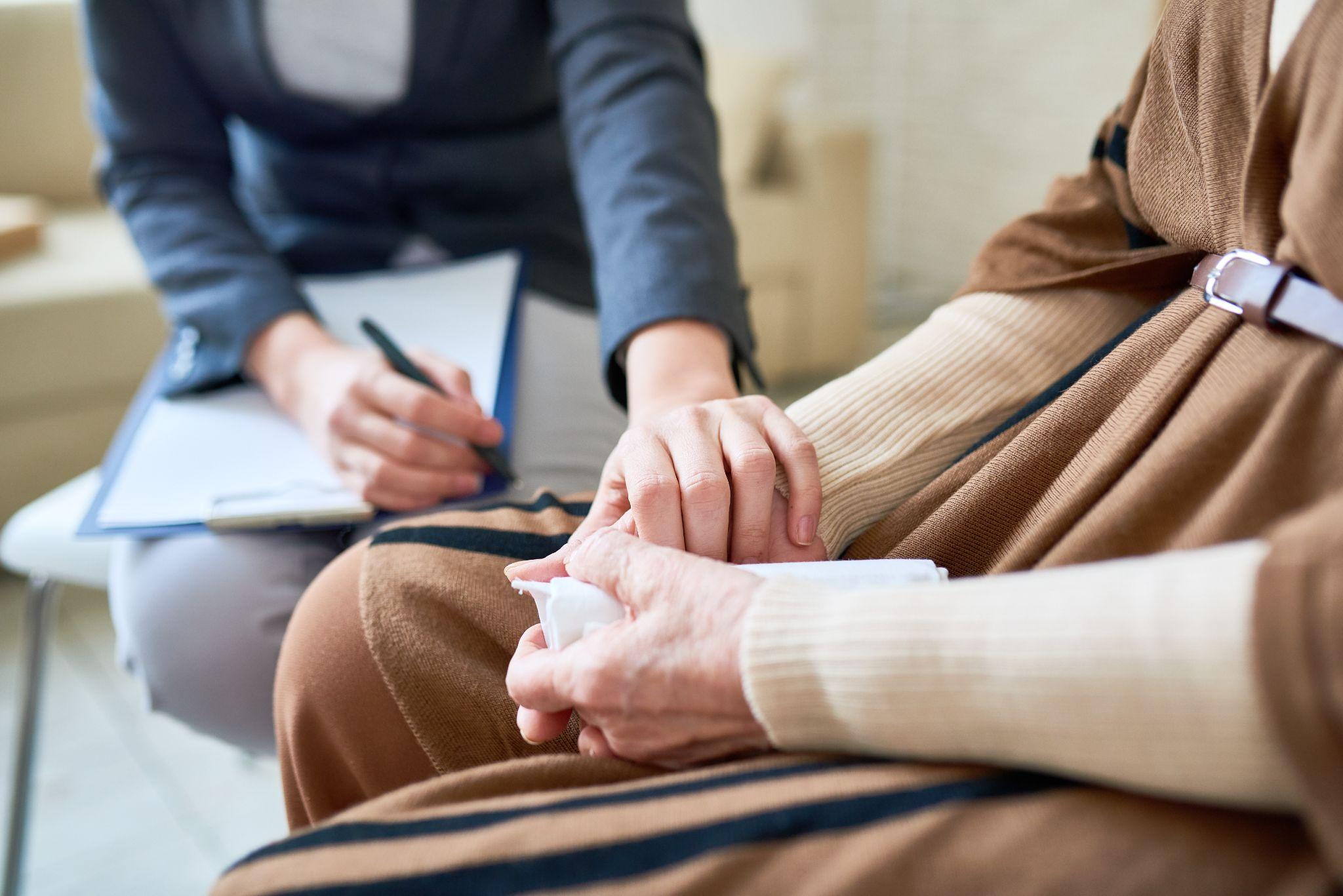
Our Addiction Resources
Navigating the world of addiction and recovery can be overwhelming. We’re here to provide clear, compassionate education and guidance. From practical advice for maintaining sobriety to informational guidance on the long-term effects of substance abuse, our content is a beacon of hope and understanding.
Our Team is Ready are ready to take your call
Call us Today!
or we can call you. Fill out form below
Our Blog

Maximizing Therapy Sessions: 7 Tips & Tricks
Therapy can be a crucial part of the recovery process for those struggling with addiction. It provides a safe space to explore emotions, set boundaries, understand thought patterns, and develop coping strategies.
However, just attending sessions isn’t enough. To truly benefit, you need to be active and engaged. Here are some tips and tricks on how to get the most out of therapy sessions.
1. Be Honest and Open
One of the most important aspects of therapy is honesty. Your therapist is there to help, not judge. You should feel comfortable with your therapist and be open about your thoughts, feelings, and experiences. This allows your therapist to provide the best possible guidance.
Remember, therapy is a confidential space where you can express yourself freely. When you withhold information or aren’t entirely truthful, it can hinder your progress. Your therapist relies on accurate information to understand your situation and to offer the most effective advice and treatment.
Honesty can also help build trust between you and your therapist, creating a more productive therapeutic relationship. Many people fear being judged for their thoughts or actions. It’s important to remember that therapists are trained professionals who have heard a wide range of experiences. They are there to help, not to judge. If you find it difficult to be open, start with small steps and gradually share more as you become comfortable.
2. Prepare for Sessions
Before each session, take some time to reflect on what you want to discuss. Think about any significant events, emotions, or challenges you’ve faced since your last session. Having a clear idea of what you want to talk about can help you make the most of your time with your therapist.
Spend a few minutes each day jotting down significant events or emotions. This can help you keep track of important topics to discuss in your next session. By doing this, you can ensure that you address all relevant issues without forgetting anything important. Looking back at your notes can help you identify patterns in your behavior or emotions.
For example, you might notice that certain situations trigger specific responses. Recognizing these patterns can provide valuable insights that you and your therapist can work on together.
3. Set Goals
Setting specific, achievable goals for your therapy journey can give you a clear direction and purpose. These goals can be short-term, like learning a new coping mechanism, or long-term, like improving relationships. Discuss these goals with your therapist and track your progress over time.
Regularly reviewing your goals and tracking your progress can provide motivation and a sense of achievement. It also allows you to adjust your goals as needed. Celebrate your successes, no matter how small, and use setbacks as learning opportunities.

4. Be Consistent
Regular attendance is key to effective therapy. Try to keep a consistent schedule and avoid missing sessions. Consistency helps build a strong therapeutic relationship and ensures steady progress. Establishing a routine for your therapy sessions can help integrate them into your life.
Consistency not only reinforces the therapeutic process but also signals to yourself that your mental health is a priority. If possible, schedule your sessions at a regular time and day each week.
Life can be unpredictable, and there might be times when you miss a session. If this happens, reschedule as soon as possible and consider online therapy as a telehealth option. Your therapist can help you navigate these disruptions and get back on track.
5. Engage Actively
Therapy is not a passive experience. Engage actively by asking questions, seeking clarifications, and providing feedback. If something isn’t working for you, let your therapist know.
Active participation helps tailor the therapy to your specific needs. Don’t hesitate to ask questions if something is unclear or if you’re curious about a particular topic. Understanding the reasoning behind certain techniques or advice can make them more effective.
Your feedback is crucial in shaping your therapy experience. If you feel that a certain approach isn’t helpful, or if you’d like to explore a different method, don’t be afraid to let your therapist know. A good therapist will adjust their strategies to better meet your needs and preferences, or help you find a therapist that can.
6. Practice Outside of Sessions
Talking therapy doesn’t end when you leave the therapist’s office. Practice the techniques and strategies discussed during your sessions in your daily life. This might include journaling, mindfulness exercises, or practicing new coping mechanisms.
Writing down your thoughts and feelings can help reinforce the insights gained during therapy. It provides an outlet for expression and can be a valuable tool for self-reflection. Try to make journaling a regular habit, noting any significant experiences or emotions.
Mindfulness exercises, such as meditation or deep breathing, can help you stay present and manage stress. These techniques can be practiced anywhere and can be particularly useful during moments of anxiety or emotional distress. Incorporate these exercises into your daily routine to build resilience.
7. Be Patient
Progress in therapy can be slow and gradual. It’s important to be patient with yourself and the process. Recovery and personal growth don’t happen overnight. You might experience setbacks or periods where it feels like you’re not making any progress at all. This is completely normal.
Each step, no matter how small, is a step forward. Your therapist is there to help you navigate these challenges and support you throughout your journey. Keep the long-term benefits in mind and stay committed to the process, knowing that patience and perseverance will lead to lasting change.
Start Therapy and Treatment Today at Lumina Recovery
Maximizing your therapy sessions requires effort and commitment. Therapy is a powerful tool in your recovery journey, and utilizing these tips can help you achieve lasting change.
Lumina Recovery offers different types of therapy programs, including individual counseling, group therapy, and specialized treatments like EMDR and CBT, tailored to support every step of the recovery journey.
If you want to start your path to a happier, healthier life, don’t hesitate to get in touch with our team.

Nembutal Addiction: What You Need to Know
Nembutal, also known by its generic name pentobarbital, is a barbiturate that has been prescribed for many years to address a range of medical issues. Although it has a well-established medical history, Nembutal presents a considerable risk of addiction, especially when it is misused or taken for a prolonged duration.
Below, we’ll explore what Nembutal is, its uses and risks, and the treatment options available for those struggling with Nembutal addiction.
What Is Nembutal and Why Is It Used?
Nembutal is a short-acting barbiturate primarily prescribed for its sedative, hypnotic, and anticonvulsant properties. It works by depressing the central nervous system (CNS), resulting in a calming effect. In the United States, Nembutal is classified as a Schedule II controlled substance by the Drug Enforcement Administration (DEA).
While it was once commonly used for the short-term treatment of conditions such as insomnia, anxiety, and seizures, its usage for these purposes has declined due to the availability of safer alternatives. Today, Nembutal is more often used in specific situations, such as controlling seizures in emergency settings or inducing anesthesia in certain medical procedures.
However, Nembutal’s potent effects on the brain also make it a drug with a high potential for abuse. Misuse or prolonged use can lead to tolerance, dependence, and eventually, addiction, which is why its use is now more restricted and carefully monitored.
Is Nembutal Addictive?
Nembutal is indeed very addictive, and this risk should not be overlooked. Misusing the drug—whether by taking it without a prescription, exceeding recommended dosages, or using it for recreational purposes, such as to experience euphoria—can quickly lead to addiction. Over time, the brain adapts to Nembutal’s effects, resulting in tolerance and physical dependence.
As tolerance increases, a person may need larger amounts of the prescription medication to achieve the desired effects, which significantly heightens the risk of addiction. Additionally, psychological dependence can emerge, where the individual feels compelled to keep using Nembutal to manage stress, anxiety, or other emotional difficulties.
Risks of Nembutal Abuse
Abuse of Nembutal carries significant risks, similar to those associated with other barbiturates. These risks include:
Respiratory Depression
Barbiturates like Nembutal have the potential to greatly reduce respiratory function, particularly when consumed in high doses or when used alongside other central nervous system depressants like alcohol. This combination can result in dangerous, life-threatening respiratory failure.1
Dependence and Withdrawal
Regular use of Nembutal, particularly in higher doses, can lead to physical dependence. Sudden withdrawal from Nembutal can be dangerous. Withdrawal symptoms can include:2
- Anxiety
- Irritability
- Insomnia
- Seizures
- Tremors
- Muscle spasms
- Nausea
- Vomiting
- Delirium
- Hallucinations
- Weakness
Because withdrawal from Nembutal can be intense and potentially dangerous, it’s crucial that individuals seek medical guidance when trying to quit. A healthcare provider can create a customized tapering schedule, slowly lowering the dose to help manage withdrawal symptoms and lessen the likelihood of serious health risks.
Overdose Potential
Because the margin between a therapeutic dose and a dangerous dose of Nembutal is very narrow, there is a high risk of overdose. Symptoms of overdose can include:3
- Confusion
- Extreme drowsiness
- Slurred speech
- Unsteady movement
- Shallow breathing
- Reduced heart rate
- Coma
If you suspect that someone has overdosed on Nembutal, it is vital to seek emergency medical help immediately.
Treatment Options for Nembutal Addiction

Addressing Nembutal addiction requires a personalized approach, with treatment plans crafted to meet the unique needs of each individual. Key components of effective treatment for the effects of pentobarbital typically include medically supervised detox, residential (inpatient) care, and outpatient programs. The combination of these strategies will depend on the severity of the addiction and the personal circumstances of the individual.
Medically Supervised Detox
Detoxification is often the critical first step in the recovery process. During a medically supervised detox, healthcare professionals carefully taper the dosage of Nembutal to manage withdrawal symptoms safely and minimize the risk of severe complications, such as seizures. This process not only ensures the individual’s safety during withdrawal but also prepares them physically and mentally for the next phases of treatment.
Residential (Inpatient) Treatment
For those who need an immersive recovery environment, residential or inpatient treatment offers 24/7 medical supervision and support. These programs provide a structured setting where individuals can fully focus on their recovery without external distractions. Inpatient treatment typically includes a combination of therapy, medical care, and peer support, making it an ideal choice for those who need intensive care to overcome their addiction.
Outpatient Programs
Outpatient treatment offers flexibility for those who either do not require the intensive support of inpatient care or who are transitioning from a residential program. This type of treatment allows individuals to continue living at home while attending regular therapy sessions and receiving ongoing medical support.
Outpatient programs, such as partial hospitalization programs (PHPs) and intensive outpatient programs (IOPs), are designed for individuals with a sober, stable living environment and a strong support system, helping them to maintain their daily responsibilities while working towards long-term recovery.
Each treatment pathway can be customized to align with the individual’s needs, ensuring they receive the appropriate level of care for their recovery from Nembutal addiction.
Seek Support for Nembutal Addiction at Lumina Recovery
Struggling with Nembutal addiction can be overwhelming, but you don’t have to face it alone. Lumina Recovery treatment centers offer comprehensive programs tailored to your specific needs, including substance use disorders with co-occurring mental health challenges. Our dedicated team is committed to guiding you through every stage of recovery, from the initial detox process to achieving long-term sobriety. Take the first step towards a healthier, drug-free future.
Reach out to Lumina Recovery today to learn more about our personalized treatment options and how we can help you or your loved one reclaim control and build a brighter tomorrow.
Sources:

What Is EMDR Therapy for Addiction?
Struggling with addiction or knowing someone who does can be overwhelming and challenging. Finding the right treatment is crucial for recovery. One effective therapy that has gained attention is eye movement desensitization and reprocessing (EMDR).
EMDR is known for its success in treating trauma, but it is also used to help people with addiction. It is important to learn what EMDR is, how it is used in addiction recovery, and how it benefits those going through recovery.
What Is EMDR?
EMDR is a type of psychotherapy designed to help individuals heal from symptoms and emotional distress caused by traumatic life experiences. It was developed in 1987 by psychologist Francine Shapiro.1
EMDR involves using bilateral stimulation, typically through guided eye movements, to help the brain process and integrate traumatic memories. This process helps reduce the emotional impact of these memories, allowing individuals to move forward without being hindered by their past.
The therapy consists of eight phases:1
- History Taking: The therapist gathers information about the patient’s history and identifies the traumatic memories that need to be addressed. This phase helps in understanding the specific issues that contribute to the patient’s distress.
- Preparation: The therapist explains the EMDR process to the patient, sets expectations, and teaches coping techniques to manage emotional stress. This phase builds trust and prepares the patient for the reprocessing of traumatic memories.
- Assessment: The therapist and patient select a specific memory to target. The patient identifies negative beliefs associated with this memory and the desired positive belief they want to replace it with.
- Desensitization: Using bilateral stimulation (such as eye movements, taps, or sounds), the therapist helps the patient process the traumatic memory. The goal is to reduce the distress associated with the memory.
- Installation: The therapist strengthens the positive belief that the patient wants to associate with the traumatic memory. This helps in replacing negative thoughts with more adaptive ones.
- Body Scan: The patient is asked to focus on any physical sensations that arise when thinking about the traumatic memory and the new positive belief. This helps ensure that the memory has been fully processed and is no longer causing physical distress.
- Closure: At the end of each session, the therapist ensures that the patient is stable and has coping strategies to manage any residual distress.
- Reevaluation: In subsequent sessions, the therapist evaluates the progress made and determines if additional processing is needed for the same memory or if new memories need to be addressed.
How EMDR Is Used in Addiction Recovery
EMDR therapy for addiction focuses on addressing the underlying trauma and emotional pain that often contribute to substance abuse. Many individuals turn to drugs or alcohol as a way to cope with unresolved trauma. By using EMDR, therapists can help patients process these traumatic experiences, reducing their reliance on addictive substances.
Trauma-focused approach. The primary goal of EMDR in addiction recovery is to process and resolve traumatic experiences that contribute to the addiction. Many individuals use substances to numb the pain of past traumas. By addressing these traumas directly, EMDR helps reduce the emotional burden that leads to substance use.
Customized treatment plans. Each patient’s experience with addiction and trauma is unique. EMDR therapists create customized treatment plans that address the specific needs and experiences of the individual. This personalized approach ensures that therapy targets the most relevant and impactful memories.
Integrating EMDR with other therapies. EMDR is often used in conjunction with other therapeutic approaches, such as cognitive behavioral therapy (CBT) and medication-assisted treatment (MAT). This integrative approach provides a comprehensive treatment plan that addresses both the psychological and physical aspects of addiction.
Reducing relapse risk. One of the significant benefits of EMDR in addiction recovery is its potential to reduce the risk of relapse. By addressing the root causes of addiction and developing healthier coping strategies, individuals are better equipped to handle triggers and cravings that might lead to relapse.
Supporting emotional stability. EMDR promotes emotional stability by helping individuals process and integrate traumatic memories. This stability is vital for maintaining sobriety and overall mental health. Patients often report feeling more balanced and in control of their emotions after undergoing EMDR therapy.

8 Benefits of EMDR in Addiction Recovery
Healing addiction with EMDR therapy offers numerous benefits for individuals in recovery. Key advantages include:
1. Addressing Root Causes
EMDR therapy for addiction treatment targets the root causes of substance abuse, such as trauma and emotional pain. By processing these underlying issues, individuals can reduce their dependence on drugs or alcohol.
2. Reducing Cravings and Triggers
EMDR helps diminish the emotional impact of traumatic memories, which can reduce cravings and triggers associated with addiction. This reduction makes it easier for individuals to maintain sobriety.
3. Enhancing Coping Skills
Through EMDR, individuals learn healthier ways to cope with stress and emotional distress. These new coping skills are essential for long-term recovery. Patients are equipped with strategies to handle situations that might have previously led them to substance use.
4. Improving Self-Esteem
By reprocessing negative beliefs and reinforcing positive ones, EMDR therapy can boost self-esteem and self-worth. A positive self-image is crucial for sustaining recovery and preventing relapse. Individuals develop a stronger sense of confidence and self-worth, which is vital for their overall well-being.
5. Decreasing Anxiety and Depression
Many people with addiction also struggle with anxiety and depression. EMDR therapy can alleviate these symptoms by addressing the traumatic experiences that contribute to these conditions. Reducing these co-occurring mental health issues can significantly improve the quality of life for individuals in recovery.
6. Promoting Overall Well-Being
EMDR therapy fosters a sense of empowerment and control over one’s life. This sense of empowerment is vital for building a healthy, fulfilling life in recovery. Patients gain a better understanding of their emotions and develop a more positive outlook on life.
7. Long-Term Efficacy
EMDR has been shown to produce long-lasting results. By effectively addressing and processing traumatic memories, individuals are less likely to experience relapses. The therapy helps create a solid foundation for sustained sobriety and emotional health.
8. Rapid Progress
Compared to some traditional therapies, EMDR can produce relatively rapid progress. This accelerated pace can be encouraging for patients and help maintain their motivation throughout the recovery process.
Try EMDR Therapy Today With Lumina Recovery
EMDR therapy for addiction is a powerful tool in the journey to recovery. By addressing the root causes of addiction and helping individuals process traumatic memories, EMDR offers a path to healing and long-term sobriety.
For comprehensive support, Lumina Recovery offers EMDR therapy alongside other therapeutic services to address addiction and mental health needs.
If you or a loved one is struggling with addiction, get in touch with us to learn more about EMDR therapy and addiction treatment. It may be the key to unlocking a brighter, healthier future.
Source:

Understanding Ritalin Abuse and Addiction
Ritalin, a well-known prescription stimulant, is commonly used to treat attention-deficit/hyperactivity disorder (ADHD) and narcolepsy. While it offers significant benefits for individuals with these conditions, its potential for abuse and addiction cannot be overlooked.
Understanding Ritalin’s medical use, its addictive nature, reasons for abuse, signs of addiction, side effects, and the withdrawal process can help individuals and their loved ones recognize and address Ritalin addiction.
What Is Ritalin?
Ritalin, or methylphenidate, is a Schedule II controlled substance and a central nervous system stimulant. Doctors prescribe Ritalin primarily for ADHD and narcolepsy. For those with ADHD, Ritalin helps improve focus, attention, and impulse control. For narcolepsy patients, it helps manage symptoms like excessive daytime sleepiness.1
Ritalin is available in various forms, including immediate-release and extended-release tablets. The immediate-release form typically requires multiple doses throughout the day, whereas the extended-release form is designed to provide a steady release of medication over several hours, reducing the need for frequent dosing and helping to maintain stable symptom control.
Side Effects of Ritalin
Taking Ritalin can lead to various adverse effects, some of which can be severe. Common Ritalin side effects include:2
- Nervousness
- Trouble sleeping
- Loss of appetite
- Weight loss
- Dizziness
- Nausea
- High blood pressure
- Vomiting
- Headache
Combining Ritalin with alcohol can be particularly dangerous. Ritalin’s stimulant effects can mask the depressant effects of alcohol, leading individuals to consume more alcohol than they realize. This combination can increase the risk of alcohol poisoning, serious health problems, and severe behavioral issues.
Addiction Potential: Why Do People Abuse Ritalin?
Despite its benefits, Ritalin has a high potential for abuse. Its stimulant properties produce effects similar to cocaine when taken in large doses or without a prescription. People may abuse Ritalin for various reasons, including enhancing cognitive performance, weight loss, euphoric effects, and staying awake.
The pressure to perform academically or professionally often drives individuals to misuse Ritalin. In competitive environments, the perceived need to stay focused and alert can lead individuals to seek out substances that promise enhanced cognitive abilities. This misuse is not limited to those with prescriptions; individuals often obtain Ritalin through illegal means, such as purchasing from those with legitimate prescriptions or through online black markets.
The misconception that prescription medications are inherently safer than illicit drugs also contributes to Ritalin abuse. Many individuals wrongly assume that because Ritalin is prescribed by medical professionals, its misuse carries fewer risks than other stimulants like cocaine or methamphetamine. This false sense of security can lead to higher rates of experimentation and subsequent addiction.
Is Ritalin Addictive?
Yes, Ritalin is addictive. Its stimulant effects can lead to physical dependence and psychological addiction. When abused, Ritalin can alter brain chemistry, making it difficult for individuals to function normally without the drug. This addiction can develop quickly, especially when the drug is taken in ways other than prescribed, such as snorting or injecting.
The addictive potential of Ritalin lies in its ability to increase dopamine levels in the brain. Over time, the brain’s natural dopamine production can diminish, leading individuals to rely on Ritalin to achieve the same pleasurable effects. This dependence can result in a cycle of addiction where larger doses are needed to attain the desired high.
Ritalin addiction can also lead to tolerance, where the body becomes accustomed to the drug, necessitating higher doses to achieve the same effects. This tolerance increases the risk of overdose, particularly when users escalate their intake without medical guidance.
Moreover, psychological dependence on Ritalin can be profound. Individuals addicted to Ritalin may experience intense cravings and compulsive drug-seeking behaviors. They might prioritize obtaining and using Ritalin over other essential activities, such as work, school, or relationships. This compulsion underscores the powerful grip that Ritalin addiction can have on a person’s life, making professional intervention crucial for recovery.
5 Signs of Addiction to Ritalin
Recognizing the signs of Ritalin addiction is necessary for early intervention. Common signs include:
- Increased Tolerance: Requiring higher doses of Ritalin to feel the same effects.
- Compulsive Use: Inability to control or reduce Ritalin use despite negative consequences.
- Obsession: Spending a significant amount of time thinking about, obtaining, or using Ritalin.
- Neglecting Responsibilities: Ignoring work, school, or family obligations due to Ritalin use.
- Withdrawal Symptoms: Experiencing physical or psychological symptoms when not using Ritalin.
Withdrawal from Ritalin Addiction
Withdrawal from Ritalin addiction can be challenging and uncomfortable, often requiring medical supervision. Common Ritalin addiction withdrawal symptoms include:2
- Fatigue
- Depression
- Sleep problems
- Increased appetite
- Cravings
- Suicidal thoughts
- Other mental/mood changes

Getting Treatment for Ritalin Addiction
Overcoming Ritalin abuse requires a comprehensive approach tailored to individual needs. Ritalin addiction treatment often involves several stages:
Acknowledgment and Seeking Help
The first step is recognizing the problem and seeking help from healthcare providers, addiction specialists, or support groups.
Medically Assisted Detoxification
Detoxification allows the body to clear Ritalin while managing withdrawal symptoms. This process is typically supervised by healthcare professionals to ensure safety and comfort.
Rehabilitation Programs
Inpatient rehabilitation provides a controlled environment with intensive therapy and medical care, away from daily stressors. Outpatient programs allow individuals to continue their daily activities while receiving treatment, suitable for those with less severe addictions or post-inpatient treatment.
Behavioral Therapy
Core to addiction treatment, behavioral therapy helps individuals understand and address the root causes of their addiction. Cognitive behavioral therapy (CBT) is commonly used, along with contingency management and motivational interviewing.
Aftercare and Relapse Prevention
Recovery is ongoing. Aftercare programs provide continuous support to maintain sobriety and prevent relapse. This includes regular therapy, sober living homes, and personalized relapse prevention plans to manage triggers and stress.
Find Support for Ritalin Addiction With Lumina Recovery
Ritalin, when used as prescribed, can be highly effective for treating ADHD and narcolepsy. However, its potential for abuse and addiction poses significant risks. If you or a loved one is struggling with Ritalin addiction, seeking professional help is crucial.
At Lumina Recovery, our dual diagnosis support addresses Ritalin substance abuse and underlying mental health conditions for a holistic, personalized treatment. With the right support and treatment, long-term recovery is possible.
Get in touch with us today to start your journey towards a healthier, drug-free life.
Sources:

Tapentadol Addiction: A Closer Look
Tapentadol is a prescription medication used to treat pain. It’s often prescribed when other pain relievers are not effective. While it can be very effective for pain management, tapentadol also has a high potential for addiction.
It’s important to know what tapentadol is, its medical uses, the potential for addiction, why people abuse it, signs of addiction, the side effects of abuse, and withdrawal symptoms. Understanding these aspects can help those struggling with addiction or concerned loved ones seek appropriate help and treatment.
What Is Tapentadol?
Tapentadol is a synthetic opioid medication doctors prescribe to help manage pain. It’s particularly useful for people who have moderate to severe pain that isn’t relieved by other painkillers. Tapentadol works by affecting the brain and nervous system to reduce the feeling of pain. It’s available in two forms: immediate-release for quick pain relief and extended-release for ongoing, long-term pain management.1
Known by the brand name Nucynta, tapentadol is used to treat a variety of painful conditions. Because it’s a strong pain reliever, it’s important to use it exactly as prescribed by a healthcare professional to avoid potential risks, including addiction.
Tapentadol’s Medical Uses
Doctors prescribe tapentadol for various types of pain that are not adequately managed by other pain medications. It is especially useful for patients with neuropathic pain, a type of pain caused by nerve damage. Conditions that may lead to neuropathic pain include diabetes, shingles, and certain injuries.
In addition to neuropathic pain, tapentadol is prescribed for musculoskeletal pain, which includes conditions like arthritis and back pain. Its efficacy in treating different types of pain makes it a versatile option in pain management.
Tapentadol is often chosen for patients who have not found relief with other opioids or non-opioid pain medications. It offers a balance between effective pain relief and manageable side effects, making it a preferred choice in many cases.
Side Effects of Tapentadol
Taking tapentadol can lead to various negative side effects. Some of the most common Tapentadol side effects include:1
- Sudden feeling of warmth
- Dry mouth
- Stomach pain
- Abnormal dreams
- Headache
- Irritability
- Drowsiness
- Anxiety
- Excessive tiredness
- Heartburn
- Difficulty falling asleep or staying asleep
Is Tapentadol Addictive?
Despite its medical benefits, tapentadol has a high potential for addiction, similar to other opioids. This risk arises from its ability to produce a tapentadol high, a state of euphoria that can be highly addictive. The sensation of euphoria is due to the drug’s action on the brain’s reward system, which can create a strong desire to continue using the medication even when it is no longer medically necessary.
People may begin abusing tapentadol for various reasons. Some may start by taking higher doses than prescribed to achieve stronger pain relief or euphoria. Others may use it to self-medicate for stress, anxiety, or other psychological issues. The abuse of tapentadol can quickly lead to dependence, where the body adapts to the presence of the drug and requires it to function normally.
The potential for addiction is also influenced by how tapentadol is taken. Crushing and snorting the tablets or dissolving them in water for injection can amplify the drug’s effects, increasing the risk of addiction. Such practices can lead to a rapid escalation in dosage, further heightening the risk of developing an addiction.
Signs of Tapentadol Addiction
Recognizing the signs of tapentadol addiction is crucial for early intervention. Some common signs include:
- Increased tolerance: Needing higher doses to achieve the same pain relief or euphoric effects.
- Withdrawal symptoms: Experiencing physical and mental symptoms when not taking the drug.
- Obsessive behavior: Spending a lot of time thinking about, obtaining, or using tapentadol.
- Neglecting responsibilities: Failing to fulfill work, school, or family obligations.
- Continued use despite harm: Using tapentadol even when it causes physical, emotional, or social problems.
Tapentadol Withdrawal
Withdrawal from tapentadol can be challenging and uncomfortable, but it is a crucial step in overcoming addiction. You may experience withdrawal symptoms such as:1
- Restlessness
- Anxiety
- Irritability
- Yawning
- Chills
- Sweating
- Difficulty falling asleep or staying asleep
- Shivering
- Muscle, back, or joint pain
- Weakness
- Nausea
- Vomiting
- Diarrhea
- Loss of appetite
- Fast heartbeat
- Widening of the pupils
- Hallucinations
These symptoms can be severe, making it important to undergo withdrawal under medical supervision. Medical professionals can provide support and medication to help manage symptoms and ensure a safer detox process.

Tapentadol Addiction Treatment
Treating tapentadol addiction typically involves a combination of medical and behavioral therapies. Here’s a detailed look at some common approaches:
Medically Assisted Detox
Medically assisted detoxification is often the first step in treating tapentadol addiction. This process involves safely managing the physical symptoms of withdrawal under the supervision of healthcare professionals. Medications may be used to alleviate withdrawal symptoms and reduce cravings. Medically assisted detox helps stabilize the patient and prepares them for the next phase of treatment.
Inpatient Rehabilitation
Inpatient rehab programs provide a structured and supportive environment for individuals struggling with tapentadol addiction. Patients live at the treatment facility for a specified period, usually ranging from 30 to 90 days or longer, depending on the severity of the addiction.
Outpatient Programs
Outpatient programs provide flexibility for individuals who cannot commit to a residential program due to work, school, or family obligations. Patients attend treatment sessions at a rehab center while living at home or in a sober living facility.
Counseling and Therapy
Counseling and therapy are crucial components of tapentadol addiction treatment. These sessions help individuals understand the underlying causes of their addiction, develop coping strategies, and build a support network.
Medication-Assisted Treatment (MAT)
Medication-assisted treatment combines medications with behavioral therapies to treat opioid addiction. Medications used in MAT can help reduce cravings and withdrawal symptoms, making it easier for patients to focus on their recovery.
Lumina Recovery Can Help With Tapentadol Addiction
By understanding tapentadol addiction, individuals and their loved ones can take proactive steps to address and treat addiction. With the right support and treatment, recovery is possible, allowing individuals to regain control of their lives and health.
If you or a loved one is struggling with tapentadol addiction, Lumina Recovery offers holistic opioid treatment programs tailored to your needs.
Contact us to learn more about our services and how we can support your recovery.
Sources:

Understanding and Overcoming Lunesta Addiction
Lunesta (eszopiclone) is a prescription drug used to treat insomnia. While it can be effective for treating sleep disorders, it also carries the risk of addiction and abuse. Understanding the nature of Lunesta addiction is essential for those struggling with it and their loved ones.
Lunesta’s Prescribed Use
Doctors prescribe Lunesta medication to patients who need help to fall asleep faster and stay asleep longer. Lunesta is a sedative-hypnotic drug and classified as a Schedule IV controlled substance. It works by slowing down brain activity to promote sleep.1
Typically, Lunesta for sleep is intended for short-term use, often recommended for no longer than a few weeks. This is because prolonged use can lead to tolerance, where the drug’s effectiveness decreases over time, and dependency.2
Lunesta is often prescribed at the lowest effective dose to minimize the risk of side effects, dependency, and substance abuse. Patients are usually advised to take it right before bedtime, ensuring they have a full night (7-8 hours) to sleep. Taking Lunesta can significantly improve sleep quality and overall well-being when used correctly, helping individuals wake up feeling more rested and functional during the day.
However, patients must follow their doctor’s instructions carefully and avoid a high dose or frequency without medical advice. Misuse, even with good intentions, can lead to unintended consequences, including addiction.
Side Effects of Lunesta
When taking this prescription medication, patients should be aware of the side effects. Lunesta’s side effects include:1
- Day-Time Drowsiness, Dizziness, “Hangover” Feeling: These symptoms can impair one’s ability to perform daily tasks safely and effectively.
- Headache, Anxiety: These side effects can affect one’s overall well-being and daily functioning.
- Dry Mouth: This can cause discomfort and affect oral health.
- Unusual Taste in Your Mouth: This can be persistent and affect appetite and enjoyment of food.
- Rash: Skin reactions that may require medical attention.
- Cold or Flu Symptoms: Including fever, body aches, sore throat, cough, runny or stuffy nose, which can add to overall discomfort and health complications.
Lunesta can have serious effects on an individual’s health and wellbeing, including:1
- Dependence: A physical and psychological need to take Lunesta. This dependence makes it challenging to stop using the drug without experiencing withdrawal symptoms.
- Mood Disorders: Increased risk of depression and anxiety. The emotional toll of addiction can exacerbate existing mental health issues or lead to new ones.
- Memory Issues: Problems with short-term This can interfere with personal and professional responsibilities, causing frustration and stress.
- Overdose: Taking too much Lunesta can result in an overdose, which can be life-threatening. Symptoms of Lunesta overdose include extreme drowsiness, confusion, difficulty breathing, and loss of consciousness.
Addiction Potential and Reasons for Abuse
Despite its benefits, Lunesta has a high potential for addiction. This risk arises because the drug affects the brain’s reward system, leading to feelings of relaxation and euphoria. These effects can cause some individuals to misuse Lunesta, taking higher doses or using it more frequently than prescribed.2
When chronic insomnia persists, individuals may continue taking Lunesta beyond the recommended period. They might increase the dose without consulting a doctor, believing it will help them sleep better.
Some people use Lunesta to cope with stress or anxiety, seeking its calming effects. The drug’s ability to induce a sense of relaxation can make it appealing for those dealing with high levels of anxiety or stress, even if they do not have a diagnosed sleep disorder.
The euphoric feelings Lunesta can induce might lead some to use it recreationally. In some cases, individuals may take Lunesta to experience a high, especially when combined with other substances like alcohol or other sedatives, enhancing its effects.
5 Signs of Lunesta Addiction
Recognizing the signs of Lunesta addiction is crucial for early intervention. Signs include:
- Increased Tolerance: This is when one needs a higher dose to feel the same effect. Over time, the body becomes accustomed to Lunesta, and the initial dose no longer produces the desired effects, prompting individuals to take more.
- Withdrawal Symptoms: Having physical or psychological symptoms when not taking the drug. Symptoms can include anxiety, shaking, sweating, nausea, and severe insomnia, making it difficult to quit without professional help.
- Cravings: A strong desire or compulsion to use Lunesta. These cravings can be intense and persistent, often leading to continued use despite a desire to stop.
- Doctor Shopping: Visiting multiple doctors to get more prescriptions for Lunesta. This behavior indicates dependency, as individuals try to secure enough of the drug to satisfy their addiction.
- Isolation: Withdrawing from friends and family to hide the extent of Lunesta use. Individuals may become secretive about their habits, further isolating themselves to avoid judgment or intervention.
Lunesta Withdrawal Symptoms
When someone dependent on Lunesta stops taking it, they may experience withdrawal symptoms. Lunesta addiction withdrawal symptoms can range from mild to severe and may include:2
- Insomnia: The return or worsening of sleep problems. This can be particularly distressing, as it was the initial reason for taking Lunesta.
- Anxiety: Heightened feelings of worry and unease. Anxiety can be severe and persistent, making it difficult to manage daily activities.
- Nausea and Vomiting: Digestive disturbances that can lead to dehydration and malnutrition if not managed properly.
- Flushing: Redness and warmth of the skin, often accompanied by sweating.
- Stomach Cramps: Abdominal pain and discomfort, which can be particularly distressing.
- Nervousness: Heightened feelings of anxiety and restlessness, making it difficult to relax or focus.
- Shakiness: Tremors or trembling hands, which can interfere with fine motor skills and daily tasks.

Getting Help for Lunesta Addiction
If you or a loved one is struggling with Lunesta addiction, seeking help is crucial. Addiction treatment options include medically assisted detox, therapy, inpatient rehabilitation, outpatient programs, and aftercare programs.
Medically assisted detox is a supervised process to manage withdrawal symptoms safely.
Therapy involves counseling to address the underlying causes of the substance use disorder and develop coping strategies, with various approaches such as cognitive behavioral therapy (CBT) helping individuals understand their addiction and learn healthier ways to manage stress and anxiety.
Inpatient rehabilitation offers intensive treatment programs providing a structured environment for recovery, with 24-hour support, therapy, and medical care, allowing individuals to focus solely on their recovery.
Outpatient programs offer flexible treatment options allowing individuals to receive care while maintaining daily responsibilities, including therapy, support groups, and medical monitoring for ongoing support.
Aftercare programs provide continued support after initial treatment to prevent relapse, including ongoing therapy, support groups, and check-ins with medical professionals to ensure long-term success.
Overcome Lunesta Addiction With Lumina Recovery
Lunesta can be a helpful medication for those struggling with insomnia, but its potential for addiction cannot be overlooked. Understanding the risks and signs of abuse, as well as the steps to take for recovery, is crucial for anyone affected by Lunesta addiction.
Lumina Recovery provides dual diagnosis support as well as telehealth options to help you or a loved one at any stage of the recovery process. With the right support, overcoming Lunesta addiction and achieving a healthier, drug-free life is possible.
If you or a loved one is struggling with Lunesta addiction, reach out to our professionals today and start your journey to a healthier, drug-free life.
Sources:

Phenobarbital Addiction: Understanding Risks, Symptoms, and Care
Phenobarbital is a medication that belongs to a class of drugs known as barbiturates, which have been used for decades to treat a variety of medical conditions. Despite its long history of use, phenobarbital carries a significant risk of addiction, particularly when misused or used over a prolonged period.
Below, we’ll explore what phenobarbital is, its uses and risks, and the treatment options available for those struggling with phenobarbital addiction.
What Is Phenobarbital and Why Is It Used?
Phenobarbital is primarily prescribed for its sedative and anticonvulsant properties. It works by depressing the central nervous system, leading to a calming effect that makes it effective in treating conditions like epilepsy, anxiety, and certain sleep disorders. Additionally, phenobarbital is sometimes used in the treatment of withdrawal symptoms from other substances, particularly in managing the symptoms of alcohol or benzodiazepine withdrawal.
Because phenobarbital can effectively control seizures and provide relief from anxiety, it is often considered a valuable medication by medical professionals. However, its potent effects on the brain also make it a drug with a high potential for abuse. When taken in higher doses than prescribed or used for an extended period, individuals may develop a tolerance to the drug, leading to dependence and, eventually, addiction.
Is Phenobarbital Addictive?
Yes, phenobarbital is addictive, and its potential for addiction should not be underestimated. Addiction to phenobarbital can develop when the drug is misused—whether by taking it without a prescription, using higher doses than recommended, or using it for non-medical purposes, such as to achieve a euphoric effect. Over time, the brain becomes accustomed to the presence of phenobarbital, leading to tolerance and physical dependence.
As tolerance builds, the individual may require higher doses to achieve the same effects, which can further escalate the risk of addiction. Psychological dependence can also develop, where the individual feels compelled to continue using the drug to cope with stress, anxiety, or other emotional challenges.
Risks of Phenobarbital Abuse
Abuse of phenobarbital, like other barbiturates, carries significant risks. These risks include:
Respiratory Depression
Phenobarbital can significantly slow down breathing, especially when taken in large doses or combined with other central nervous system depressants like alcohol. This can lead to life-threatening respiratory failure.1
Dependence and Withdrawal
Regular use of phenobarbital, particularly in higher doses, can lead to physical dependence. Withdrawal from phenobarbital can be dangerous and include symptoms such as:2
- Anxiety
- Irritability
- Insomnia
- Seizures
- Tremors
- Muscle spasms
- Nausea
- Vomiting
- Delirium
- Hallucinations
- Weakness
Due to the potential severity of withdrawal symptoms, it is crucial that individuals attempting to stop using phenobarbital do so under medical supervision. A healthcare professional can develop a tapering plan, gradually reducing the dose to minimize withdrawal symptoms and reduce the risk of severe complications.
Overdose Potential
Because the difference between a safe dose and a dangerous dose of phenobarbital is very small, there is a high risk of overdose. Symptoms of overdose can include:2
- Confusion
- Extreme drowsiness
- Slurred speech
- Unsteady movement
- Shallow breathing
- Reduced heart rate
- Coma
If you suspect that someone has overdosed on phenobarbital, it is vital to seek emergency medical help immediately.
Treatment Options for Phenobarbital Addiction

Treating phenobarbital addiction involves various options that cater to the specific needs of each individual. The key components of treatment are medically assisted detox, inpatient treatment, and outpatient treatment. Depending on the severity of the addiction and the individual’s situation, different combinations of these options may be appropriate.
Medically Assisted Detox
Detoxification is often the first step in addressing phenobarbital addiction. During this process, healthcare professionals gradually reduce the dosage of phenobarbital to safely manage withdrawal symptoms and prevent complications like seizures. This medically supervised approach is crucial for ensuring safety during withdrawal and preparing the individual for further treatment.
Inpatient Treatment
For those requiring intensive care and support, inpatient treatment provides a structured environment where individuals can focus entirely on their recovery. Inpatient programs offer 24/7 medical supervision, therapy, and peer support, making it ideal for those who need a controlled setting to manage cravings and address the underlying causes of their addiction without outside distractions.
Outpatient Treatment
Outpatient treatment is a flexible option for those who do not need the intensity of inpatient care or for those transitioning from inpatient treatment. This approach allows individuals to live at home while attending regular therapy sessions and receiving medical support.
Outpatient programs, including PHPs and IOPs, are suitable for individuals with a stable living environment, strong support systems, and a lower risk of relapse, offering them the ability to maintain daily responsibilities while continuing their recovery journey.
Each of these options can be tailored to meet the specific needs of the individual, ensuring that they receive the appropriate level of care to support their long-term recovery from phenobarbital addiction.
Get the Help You Need at Lumina Recovery
If you or someone you love is struggling with phenobarbital addiction, it’s essential to seek professional help as soon as possible. At Lumina Recovery, we offer a range of treatment programs designed to address the unique challenges of substance use disorders and co-occurring mental health conditions. Our compassionate team is here to support you every step of the way, from detox to long-term recovery.
Don’t wait—contact Lumina Recovery today to learn more about how we can help you or your loved one regain control and start living a healthier, drug-free life.
Sources:

Chemsex Addiction Guide
In recent years, chemsex has gained attention as a significant public health concern, particularly within certain communities. The term refers to the use of drugs to enhance sexual experiences, often leading to risky behaviors and a heightened potential for addiction. While chemsex can be appealing due to the intense pleasure it offers, the dangers associated with this practice are substantial, ranging from serious health risks to the development of a dependency on the substances involved.
Below, we’ll explore what chemsex is, the associated risks, and the available treatment options for those struggling with chemsex addiction.
What Is Chemsex?
Chemsex, also known as “party and play” or “wired play,” involves the use of drugs to prolong and intensify sexual experiences. This practice is particularly associated with the gay community, where it has become intertwined with social and sexual dynamics.1
People may participate in chemsex for various reasons, such as enhancing sexual pleasure, coping with loneliness or anxiety, or feeling a sense of belonging within a group. However, these initial motivations can quickly spiral into a harmful cycle of substance use and risky behaviors.
Common Drugs Used in Chemsex
Chemsex typically involves the use of specific substances to enhance sexual experiences. Chemsex drugs can vary, but the following are among the most commonly associated with chemsex:1
- GHB/GBL: Often referred to as “G,” this depressant induces euphoria, relaxation, and lowered inhibitions. It is popular in chemsex for its ability to intensify pleasure. However, it carries significant risks, including overdose, which can be life-threatening, especially when mixed with other substances like alcohol.
- Crystal Meth: This is a powerful stimulant that increases energy, arousal, and sexual stamina. It is highly addictive and can lead to severe mental health issues such as paranoia, aggression, and psychosis. Its use is particularly associated with prolonged sexual sessions and risky behaviors.
- Cocaine: Known for its stimulating effects, cocaine is sometimes used in chemsex to increase confidence, energy, and sexual drive. However, it also comes with significant risks, including cardiovascular issues, anxiety, and a high potential for addiction.
- MDMA: MDMA is known for its empathogenic effects, increasing feelings of emotional closeness and sensory perception. It is often used in chemsex to enhance intimacy and pleasure. However, it can lead to dehydration, hyperthermia, and long-term effects on mental health, such as depression and anxiety.
- Amyl Nitrates: Commonly referred to as “poppers,” these are inhaled substances that provide a quick rush of euphoria and relaxation of muscles, particularly those in the anus, making them popular in the context of anal sex. Despite their short duration of effect, they can cause dangerous drops in blood pressure and headaches.
- Ketamine: This dissociative anesthetic is used in chemsex for its ability to create a sense of detachment from reality and reduce pain. While it can enhance sexual experiences for some, it also poses serious risks, including bladder damage, memory loss, and the potential for overdose.
- Alcohol: Although often overlooked, alcohol is frequently used in chemsex settings to lower inhibitions and enhance the effects of other drugs. However, its depressant effects can be dangerous when combined with other substances, particularly GHB, and it can contribute to risky sexual behaviors and addiction.
These substances, when used in combination or in the context of chemsex, can significantly increase the risk of addiction, adverse health effects, and dangerous sexual behaviors.
Dangers Associated With Chemsex

The dangers of chemsex are significant and multifaceted, involving both the physical risks of drug use and the potential for sexual health complications. Some common side effects and risks include:
- Increased Risk of STIs: The combination of drug use and sexual activity can lead to risky sexual behaviors, such as unprotected sex, which increases the likelihood of contracting sexually transmitted infections (STIs), including HIV.2
- Risk of Overamping or Overdosing: The intense and prolonged use of stimulants like crystal meth can lead to “overamping,” where the body is overstimulated, resulting in symptoms such as extreme anxiety, paranoia, seizures, and heart failure. Additionally, the use of depressants like GHB carries a high risk of overdose, especially when mixed with alcohol or other substances, potentially leading to respiratory failure and death.1
- Slamsex and Its Risks: A particularly dangerous practice within chemsex is “slamsex,” where individuals inject drugs before or during sex. This method of drug administration can lead to severe health complications, including abscesses, vein damage, and an increased risk of overdose. Additionally, injecting drugs increases the likelihood of bloodborne infections, such as HIV and hepatitis C, especially when needles are shared.3
Treatment Options for Chemsex Addiction
Recognizing and addressing chemsex addiction can be challenging, but it is a crucial step toward recovery. Treatment typically involves a combination of substance use treatment and sexual health support, focusing on both the physical and psychological aspects of addiction. Here are some of the key treatment options:
Detoxification
The first step in treating chemsex addiction is often detoxification, which involves safely managing withdrawal symptoms as the body clears the drugs. This process should be done under medical supervision to ensure safety and comfort.
Inpatient Treatment
Inpatient or residential treatment programs provide a structured environment where individuals can focus entirely on their recovery. These programs offer 24/7 medical care, therapy, and support in a drug-free setting. This level of care is particularly beneficial for those with severe addiction or those who need a break from their usual environment to avoid triggers.
Outpatient Treatment
Outpatient treatment programs, including PHPs and IOPs, allow individuals to continue living at home or in a sober living facility while attending therapy sessions and receiving professional care. This option is ideal for those who have strong support systems and need flexibility to manage other responsibilities, such as work or family. Outpatient programs can vary in intensity, from a few hours a week to several hours a day, depending on the individual’s needs.
Counseling and Therapy
Psychotherapy plays a critical role in treating chemsex addiction. Cognitive behavioral therapy (CBT) can help individuals identify and change the thought patterns that contribute to their drug use. Group therapy and support groups can also provide a sense of community and shared experience, which is especially important for those who may have engaged in chemsex as a way to connect with others.
Sexual Health Support
Given the intersection of drug use and sexual activity in chemsex, addressing sexual health is a vital component of treatment. This may involve regular testing for STIs, education on safer sex practices, and counseling to address any underlying sexual health issues.
Relapse Prevention
Long-term recovery from chemsex addiction requires ongoing support and strategies to prevent relapse. This can include developing healthy coping mechanisms, building a strong support network, and creating a plan for avoiding triggers.
Get the Support You Need at Lumina Recovery
At Lumina Recovery, we recognize the complexities of chemsex addiction and are committed to providing a holistic and comprehensive approach to treatment. While we do not specifically treat behavioral addictions like sex addiction, our programs are designed to address the substance use component of chemsex. This includes managing co-occurring mental health disorders, such as depression or anxiety, that may contribute to substance use.
Our treatment plans are tailored to meet the unique needs of each individual, offering a combination of medical care, counseling, and ongoing support to help you achieve lasting recovery.
If you are struggling with a substance use disorder, reach out to us today to learn more about our treatment options and how we can support you on your journey to recovery.
Sources:

How Addiction Affects Relationships
Substance abuse, whether involving drugs or alcohol, can profoundly impact relationships. It often leads to serious psychological issues, including altered brain function, erratic behavior, and long-term personality changes. These effects can place significant strain on relationships.
Addiction frequently results in emotional disconnection, which erodes intimacy and trust among partners, family members, friends, and colleagues. As individuals prioritize substance use over their loved ones, feelings of neglect and resentment can develop, leading to friction and, eventually, relationship breakdown.
Who Is Affected by Substance Abuse?
Alcohol or drug abuse affects a wide range of people beyond the individual struggling with the substance use disorder, including:
- Romantic Partners: Partners may experience emotional distress and trust issues as secrecy and manipulation become prevalent. This behavior can bring forth feelings of neglect and abandonment, and sometimes lead to emotional or physical abuse.
- Family Members: Parents, siblings, and children often face emotional trauma, financial strain, and disrupted family dynamics. Children, in particular, may suffer from neglect or abuse, affecting their behavior and emotional well-being. Parental substance abuse can also impair the ability to care for children, potentially leading to the loss of parental rights.
- Friends: Friends might feel helpless, stressed, or frustrated while supporting a loved one with substance abuse To protect their own well-being, they may distance themselves, especially if the individual becomes defensive or withdrawn. This can damage long-term friendships.
- Employers and Colleagues: Substance abuse can result in decreased productivity, erratic behavior, poor decision-making, and increased absenteeism. It can also lead to workplace accidents, impacting both the individual and their colleagues, as well as the overall work environment.
- Society: The broader societal impact includes exacerbated mental health issues, increased premature deaths, higher violent crime rates, and rising healthcare costs. Tragically, substance abuse often prevents individuals from leading healthy, fulfilling lives.
How Substance Abuse Affects Relationships
The impact of drug or alcohol addiction on relationships can be profound and devastating. Here are a few key reasons why:
- Breakdown in Communication and Trust: Substance abuse often leads to misunderstandings and confusion. The individual struggling might avoid honest communication or withhold information out of fear. This loss of trust can create emotional disconnection, deep feelings of betrayal, and resentment. As conflicts intensify, both partners may feel increasingly isolated, potentially leading to emotional or even physical harm.
- Financial Strain, Debt, and Legal Issues: Addiction can create severe financial problems, including borrowing from family, taking out loans, or engaging in illegal activities to fund substance use. Prioritizing drugs or alcohol over essential expenses can deplete financial resources, making it hard to meet basic needs like housing, food, and healthcare. This can result in foreclosure, repossession, and legal fees, impacting both the individual and their loved ones.
- Codependency and Enabling Behaviors: Enabling involves unintentionally supporting harmful behavior by shielding the individual from consequences, such as providing financial help or making excuses. Enabling behaviors can prolong substance abuse and delay seeking help.
- Codependency occurs when loved ones become overly involved in the person’s life, neglecting their own needs. This unhealthy dynamic makes it hard to set boundaries, creating a toxic relationship that sustains the addiction.
How to Ask for Help
Asking for help with substance abuse can be daunting due to fears of being a burden or appearing weak. Concerns about judgment or rejection may lead to silence, but it’s crucial to remember that support is available, and you can seek help confidently:
- Call a hotline. This provides anonymous, confidential guidance from trained professionals. It’s a safe way to explore your options and receive emotional support, with no obligation to commit to drug or alcohol
- Write a letter or email. For those struggling with confusing thoughts about their substance abuse and finding it hard to express them verbally, writing can be a helpful alternative. It lets you organize your thoughts calmly and may provide new insights into your situation. Once sent, the message is final, offering a sense of relief and commitment.
- Reach out to someone who’s been there. Talking to someone who has experienced addiction can make you feel less alone. They can offer practical tips and understanding from their own recovery journey.
- Consult a doctor or treatment professional. Doctors and substance abuse specialists provide confidential, non-judgmental advice on addiction treatment options. Their expertise ensures you receive evidence-based care.
- Join an online support group. Online groups provide 24/7 support, offering a vital connection with others and reducing feelings of isolation, especially during times of crisis. The sense of community and belonging found in these groups is truly invaluable.

How to Mend Relationships
Repairing unhealthy relationships after addiction is challenging, but with patience, effort, and sincerity, it’s achievable. Remember, all is not lost—there is a hopeful path forward with the right support.
- Acknowledge the damage. Take responsibility for the harm caused by your addiction, showing commitment to making things right.
- Offer a sincere apology. A genuine apology can start the healing process. Don’t be discouraged if anger or distrust arise—these are part of the journey.
- Listen and validate feelings. Ultimately, your loved ones must be willing to reconnect and try to rebuild your relationship, which can be a vulnerable decision if they’ve been hurt in the past. Allow them to express their emotions without interruption. Listening and validating their experiences helps them feel heard and understood.
- Take action to make amends. Demonstrate your commitment to change and making amends through actions like repaying debts or fulfilling promises.
- Be patient and give space. Rebuilding trust takes time. Be patient and allow your loved ones the space they need to heal. Remember, your experience is as valid as theirs. Respecting everyone’s boundaries and feelings is crucial.
- Seek professional help. Consider couples or family therapy to address underlying issues and enhance communication and conflict resolution skills.
Restore Your Relationships With Lumina Recovery
Rebuild and strengthen your relationships with the compassionate support and personalized strategies of Lumina Recovery. We believe that loving, healthy relationships are within reach during addiction recovery.
Our treatment programs include group therapy and family therapy, which are designed to heal emotional wounds caused by addiction and foster genuine, lasting connections with your loved ones.
Contact us today—our dedicated team is here to support you with patience and care, helping you enhance relationships to improve your overall quality of life.
Additional Resources
Once you have completed your rehabilitation program at one of our drug and alcohol treatment centers, you should try to surround yourself with people who can encourage you to stay sober. Many people find that support groups are the best source of encouragement. You can find hundreds of support groups and meetings in your community. Our drug addiction treatment centers stress the importance of personal chemical dependency resources, especially when you are new to sobriety. Below are various addiction and mental health resources for people in recovery who want additional support.
Christian Addiction Recovery Resources
Our substance abuse services aren’t limited to specific programs, but rather we believe in the importance of incorporating faith-based programs to promote spiritual healing, like our Faith in Recovery program.
With that said, below are some faith-based addiction recovery resources that could help you in your spiritual healing from addiction:
- Battlefield of the Mind by Joyce Meyer
- Boundaries by Dr. Henry Cloud & Dr. John Townsend
- Christian Families in Recovery: A Guide for Addiction, Recovery, and Intervention Using God’s Tools of Redemption by Robert and Stephanie Tucker
- Club New Life Christian Ministry for Addiction and Recovery
- Lost & Found: Recovery in Christ by Bruce Stanley
- Overcoming Emotional Obstacles through Faith: Navigating the Mind Field by Anthony Acampora, Director of Banyan’s Faith in Recovery Program
- The Case for Christ by Lee Strobel
Mental Health Resources for Recovery
Lumina Recovery consist of both mental health and substance abuse treatment facilities, meaning we offer mental health resources as well as chemical dependency resources. What’s more, addiction often co-occurs with mental illness, making these resources ever more important.
Below are some resources for mental health recovery that can help you or your loved one:
- This Emotional Life video series
- No Kidding, Me 2!! with Joe Pantoliano
- Dare: The New Way to End Anxiety and Stop Panic Attacks by Barry McDonagh
- Pleasure Unwoven: An Explanation of the Brain Disease of Addiction by Kevin McCauley
- Declutter Your Mind: How to Stop Worrying, Relieve Anxiety, and Eliminate Negative Thinking by S.J. Scott and Barrie Davenport
Call Us Today – (877) 716-7515

